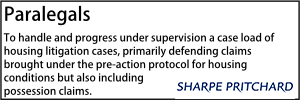



Automatic suspensions and the public interest
News
Ashfords bolsters procurement team with partner hire
Hugh James expands commercial team with partner hire
Must read
Families refusing access to support
Features

Local government reorganisation: the impact on procurement and contracts

The Procurement Act 2023 and new homes

Navigating automatic suspensions

Contracting authorities and pipeline notices

Lifting the automatic suspension: the need for evidence
Webinars
Social Partnership and Public Procurement (Wales) Act
More features
Seeking clarification of tenders
Impending Procurement Act: What you need to know
AI and procurement
Social Partnership and Public Procurement (Wales) Act
Why should you sweat the (seemingly) small stuff?
Procurement Act government guidance – Perhaps 'not a reliable method of interpretation of the law'?
Contract management and performance
The Procurement Act 2023 and development agreements
The National Procurement Policy Statement – an opportunity for mission driven procurement?
Procurement Act 2023: Are you ready?
Modification of contracts existing before the go-live date of the Procurement Act 2023
Unpicking the Procurement Act Episode 4: Challenges and Remedies
Unpicking the Procurement Act Episode 3: Contract Modification
Unpicking the Procurement Act Episode 2: Exclusion and Debarment
Unpicking the Procurement Act Episode 1: Overview and New Procedures
Dynamic purchasing systems and below threshold contracts
Procurement Act 2023: Light Touch Regime
Procurement Act guidance on frameworks is out – Buyers beware!
Local authority owned companies and the Teckal exemption
Challenges to exclusion
Challenges to exclusion
Update on limitation periods
The new procurement regime approaches
Before, during and after a waste procurement process
Disclosure in procurement disputes
The Procurement Act 2023: "go-live" confirmed
Improving social value: a private sector perspective
What’s in the Pipeline?
Procurement Act 2023 – Teckal & Hamburg Exemption
Procurement Act 2023 – Relaxation of section 17 Local Government Act 1988
Careers News
- Details
The Public Law Partnership of 27 local authorities will this month run a training session on the core competencies of being a head of legal.
The session is intended to act as a pilot for the Next Steps Mentoring Programme run by the Partnership, which comprises councils in Essex, Suffolk and Hertfordshire.
It is targeted at senior or principal solicitors who are looking to move up the career ladder to more senior roles.
The speaker at the session on 14 June will be Bevan Brittan partner Olwen Dutton, who is a former chief executive of a county council and also an ex-chief executive of a regional local government organisation.
David Lawson, Deputy Head of Legal & Deputy Monitoring Officer at Thurrock Council, said the PLP believed the session to be unique.
He added: “It is tied in with a mentoring scheme and may in the future result in a diploma from one of our partner universities.”
For more information, contact David at
- Details
Legal services regulation has become the latest area to be put under the spotlight as part of the Government’s ‘Red Tape Challenge’.
- Details
The Cabinet at Southwark Council has recommended a management shake-up that would see the local authority’s chief legal officer role deleted along with a number of other senior posts as part of a drive to save more than £1m over the next two years.
Deborah Collins, the borough’s Strategic Director of Communities, Law and Governance, is to switch to the non-lawyer role of Strategic Director of Environment and Leisure. She will remain on the Corporate Management Team headed by Southwark's chief executive.
Under the plans, Collins' current post will disappear from 1 October 2012 along with the roles of Strategic Director of Health & Community Services and Deputy Chief Executive. The monitoring officer role will be handed to the Head of Legal Services, who will become the Service Director of Legal Services and placed on a higher grade in the organisation.
The posts of Strategic Director of Children’s Services and Finance Director will meanwhile be renamed Strategic Director of Children’s & Adults Services, and Strategic Director of Corporate Services respectively. They will take on the majority of services and subsume the relevant statutory roles covered by the deleted posts, other than the monitoring officer post.
Southwark aims to save a total of £1m in 2012/13 and 2013/14 through the package of measures, which would also see two posts of Assistant Director of Finance deleted and a new post of head of service for Resources created. The section 151 officer is to be redesignated.
The overhaul will also see the council’s Legal Services Division transfer under the authority of the new Strategic Director of Corporate Services.
Southwark’s appointments committee will be formed to make recommendations to the council on appointments to head of paid service and monitoring officer.
The Cabinet also noted that all chief officer posts are contractually inter-changeable, with placement of function and post-holders therefore delegated to the head of paid service.
Collins told Local Government Lawyer that her switch to the role of Strategic Director of Environment and Leisure was a very positive development for her and recognition that lawyers do run services.
She added: “The changes will lose the chief legal officer post but everywhere is having to cut their numbers of chief officer posts. It is just a fact of life.
“But what is really good here is that the new monitoring officer will still be recognised as a key officer within the grading structure of the organisation.”
Cllr Peter John, leader of the Council, said: “We are delivering on our promise to save £1m from the senior management structure of the council because it is right, when the council has had its budget cut by £90m, that savings are made at the top of the organization so that frontline services are protected as far as possible.
“What is important is that we achieve these savings without compromising on the services we deliver. Councillors and senior officers will need to work closer to deal with the range of challenges that emerge from having a lot less money available. The new structure will place the council in the best possible position, working in a more dynamic, collaborative way and enabling us to deliver our vision of a fairer future for all in Southwark.”
- Details
The Solicitors Regulation Authority has set a deadline of 21 September 2012 for solicitors practising criminal advocacy to notify the regulator that they will be seeking accreditation under the Quality Assurance Scheme for Advocates (QASA).
The SRA said the notification process – subject to approval by the Legal Services Board – would start on 2 July.
It is expected to provide the regulator with data about the number of advocates affected by QASA, ahead of the launch of the live registration and evaluation elements of the scheme in December 2012.
QASA is a joint project between the SRA, the Bar Standards Board and ILEX Professional Standards. It was originally billed for launch in April 2012.
The notification procedure will see advocates required to notify their regulators on a web-based form that:
- they intend to join the scheme; and
- to provide an indication as to the level at which they will join the scheme; and
- to indicate the circuit on which they undertake most of their criminal advocacy work.
This data will then be matched with other data held by the regulator, such as higher rights of audience.
Papers for this week’s SRA Board meeting said that from December 2012 onwards advocates practising criminal advocacy would be required to seek their accreditation during a phased launch.
Advocates will register by self-assessing their QASA level, after which they will be given a provisional accreditation.
They will then be required to obtain an assessment of their competence – by judicial evaluation or in some cases by assessment organisation – after which they can apply for full accreditation.
The launch of the scheme will take place in three phases, with advocates working on specified circuits being required to join the scheme during the course of 2013.
“It is expected that by the end of 2013 all advocates who are required to obtain a QASA accreditation will be at least provisionally accredited and many will be fully accredited,” the board papers said.
The three regulators are also to launch a fourth consultation on the final proposals for QASA. The draft consultation will be discussed by the SRA Board on 4 July.
- Details
The Solicitors Regulation Authority has decided that – from 1 August 2014 – employers will not have to pay trainees a minimum salary above the national minimum wage.
At a meeting today, the SRA Board took the view that setting a minimum salary above the national minimum wage was “not in the public interest”. The two-year delay is designed to minimise the impact of the change.
The national minimum wage rate is currently £6.08 an hour.
Samantha Barrass, SRA Executive Director, said: "This decision was based on an objective consideration of very full and detailed evidence gathered through a variety of sources.”
The SRA said it had received 130 responses to its consultation. Sixty individuals in total attended nine focus group sessions held in four different cities, while more than 1,300 individuals responded to the regulator’s online survey.
The papers for the SRA Board meeting said the key messages from the consultation responses were:
- stakeholders were concerned that removal of the minimum salary would have a disproportionate impact on women and Black and Minority Ethnic (BME) groups who tended to be paid at the lower end of the market;
- stakeholders believed that the minimum salary promoted access to the profession for individuals from a range of backgrounds and that the SRA had a remit in that respect;
- stakeholders believed that there was a link between the salary an employer payed a trainee and the quality of the training it provided and that the potential for employers to offer lower salaries might produce less competent solicitors;
- many stakeholders called for a deferral of a decision about the minimum salary until the findings of the Legal Education and Training Review (LETR) were known;
- the majority of stakeholders believed the SRA had a remit in the setting of a minimum salary because of its obligations to "encourage an independent, strong, diverse and effective legal profession";
- a minority of stakeholders responding to the consultation, including the Sole Practitioners' Group and some would-be trainees, were in favour of deregulation. “The basis of their support for deregulation was the potential for deregulation to open up the market for training contracts, even if these were lower paid training contracts, and create more opportunities for individuals currently excluded from qualification due to difficulties securing a training contract.”
Under the current rules, law firms are required to pay trainees a minimum of £16,650 a year. In London, the figure is £18,590.
The Law Society, which brought in the minimum salary in 1982, attacked the SRA’s decision, saying the minimum wage for trainees “plays a crucial role in promoting equality of opportunity and acts as a safeguard to avoid exploitation.”
It also pointed out that the threat to diversity in the profession was highlighted by the SRA's equalities impact assessment.
A Chancery Lane spokeswoman said: “The Law Society was concerned that the result of this decision will be that trainees who will be offered the reduced minimum salary, who are likely already to have substantial debts, will find themselves in significant financial difficulty and forced to take on other work which will distract them from giving full attention to the training contract.
“Alternatively, those trainees who have private means will receive an undue advantage over potentially more meritorious candidates. Neither result will be good for the diversity of the profession. These views were supported by the SRA's own Equalities Impact Assessment and we are surprised and disappointed that the SRA did not place greater weight on its findings.”
The Law Society said it would be monitoring the effects of the decision closely.
- Details
Browne Jacobson has bolstered its insurance and public risk team with the hire of two senior lawyers from DAC Beachcroft.
Tony Child joins as a consultant while Ros Foster becomes an associate.
Child has acted in a number of leading public law cases over his 40-year career, including Porter v Magill and Livingstone v Standards Board for England.
Foster’s previous roles meanwhile include working as Head of Fitness to Practise Legal Services at the General Dental Council and various positions in local government.
Richard Barlow, partner at Browne Jacobson, said: “We are delighted to welcome Tony and Ros to join our team. We are confident that their skills and experience will complement and enhance our offering to the public sector, particularly in relation to public and administrative and local government law, such that we can continue to provide both new and existing clients with an excellent service.”
Page 81 of 88
Head of Governance & University Solicitor
Senior Lawyer - Advocate
Assistant Director - Legal & Governance
Director of Legal and Governance (Monitoring Officer)
Events

Events

Events

 Back to Basics: Construction Insurance and Insolvency - Devonshires
Back to Basics: Construction Insurance and Insolvency - Devonshires
16-07-2025 2:00 pm
Online (live)
 Institutional landlord series: Service and Notices – from Possessions to Injunctions and Requests for Access - 5 Pump Court
Institutional landlord series: Service and Notices – from Possessions to Injunctions and Requests for Access - 5 Pump Court
16-07-2025 4:00 pm
Online (live)
 HMPL Building Blocks: Tackling Non-occupation and Sub-letting - Devonshires
HMPL Building Blocks: Tackling Non-occupation and Sub-letting - Devonshires
17-07-2025
Online (live)
 To establishing whether Material Changes of Use have occurred - Ivy Legal Training
To establishing whether Material Changes of Use have occurred - Ivy Legal Training
18-07-2025 9:30 am
Online (live)
 Business and Property Masterclass #5: Interim Relief – Acting urgently and getting it right - Cornerstone Barristers
Business and Property Masterclass #5: Interim Relief – Acting urgently and getting it right - Cornerstone Barristers
10-09-2025 11:00 am
Online (live)
 Business and Property Masterclass #6: Rights of Light and Restrictive Covenants - Cornerstone Barristers
Business and Property Masterclass #6: Rights of Light and Restrictive Covenants - Cornerstone Barristers
23-09-2025
Online (live)
 HMPL Building Blocks: Service Charges & Ground Rent – Tackling Leasehold and Shared Ownership Arrears - Devonshires
HMPL Building Blocks: Service Charges & Ground Rent – Tackling Leasehold and Shared Ownership Arrears - Devonshires
14-10-2025
Online (live)
 Institutional landlord series: Possession – High Court Enforcement - 5 Pump Court
Institutional landlord series: Possession – High Court Enforcement - 5 Pump Court
22-10-2025 4:00 pm
Online (live)
 Institutional landlord series: Costs Recovery and Legally Aided Parties - 5 Pump Court
Institutional landlord series: Costs Recovery and Legally Aided Parties - 5 Pump Court
05-11-2025 4:00 pm
Online (live)
 HMPL Building Blocks: Law and Procedure Following Death of a Tenant - Devonshires
HMPL Building Blocks: Law and Procedure Following Death of a Tenant - Devonshires
09-12-2025
Online (live)
 HMPL Building Blocks: Legal Tools to Combat Anti-Social Behaviour - Devonshires
HMPL Building Blocks: Legal Tools to Combat Anti-Social Behaviour - Devonshires
17-02-2026
Online (live)
 HMPL Building Blocks: Tenancy Management – Assignment, Mutual Exchange and Succession - Devonshires
HMPL Building Blocks: Tenancy Management – Assignment, Mutual Exchange and Succession - Devonshires
12-03-2026
Online (live)

























































 A-Z Family Law: Take Two! - 42 Bedford Row
A-Z Family Law: Take Two! - 42 Bedford Row  Executive Programme in Public Procurement Law and Policy - University of Nottingham
Executive Programme in Public Procurement Law and Policy - University of Nottingham  Property Law Roadshow 2025 - Bristol - St John's Chambers
Property Law Roadshow 2025 - Bristol - St John's Chambers  CUBAS Comprehensive Training & Licencing (Manchester), September 2025
CUBAS Comprehensive Training & Licencing (Manchester), September 2025  AI in the Public Sector Conference - Westminster Insight
AI in the Public Sector Conference - Westminster Insight  Activism in the Workplace - 42BR Barristers Employment Law Annual Lecture
Activism in the Workplace - 42BR Barristers Employment Law Annual Lecture  DoLS Authoriser Training - LPS Law
DoLS Authoriser Training - LPS Law  Property Law Roadshow 2025 - Cardiff - St John's Chambers
Property Law Roadshow 2025 - Cardiff - St John's Chambers  Annual Fraud Conference 2025 - Oxford Investigation Service
Annual Fraud Conference 2025 - Oxford Investigation Service